
She drives a 2015 Nissan Altima that she recently bought with years’ worth of savings from her part-time job at Chick-fil-A, but if money had been no object she would have gotten one of the various cars she’s dreamed up on the design-your-model part of Tesla’s website.
And she uses the word "like” in conversation, like, a lot.
But get to know Faduma a little bit and it quickly becomes clear: Beyond the superficial stuff, there’s not much typical about who she is, or what she represents, or where she comes from.
On Thursday, the young woman born 18 years ago in a Somali refugee camp in Kenya will become the first female in her family to receive her high school diploma — from Myers Park in Charlotte — then will get ready to study biomedical engineering at N.C. State University on a full scholarship.
It’s easy to be impressed by her story.
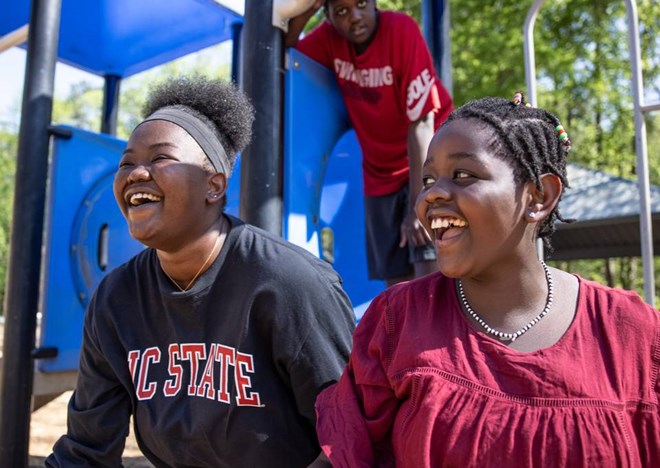
Faduma, left, with her younger sister Isha. Khadejeh NikouyehKNIKOUYEH@CHARLOTTEOBSERVER.COM
The story of what Nur Muhina and Khadija Muya went through so that Faduma and their eight other children could be successful, meanwhile? It is downright astonishing.
"I’ve heard the stories a lot of times, but every time it still feels like it’s new again,” Faduma says while sitting in the tiny dining room of the family’s 1,100-square-foot five-bedroom apartment off Wendover Road next to her mother, Khadija.
Khadija has just finished an emotional re-telling of her and Nur’s 15-day trek from Somalia to Kenya, and of their 12-year existence in a refugee camp, where she birthed the first five of their children — Faduma being the youngest when they finally boarded a plane bound for the U.S.
Faduma continues: "I mean, it’s pretty crazy (what they went through). Scary, too.”
Those, in fact, are understatements.
A HARROWING JOURNEY
Nur and Khadija both came from poor families in Mogambo, Somalia. Khadija had the equivalent of about an eighth-grade education, while Nur never attended school in Africa.
They married in 1991, when he was 28 and she was 18.
That same year, the Somali civil war began, first as an armed resistance to the regime of then-president Siad Barre, then as a much larger conflict between various competing factions after he was overthrown. It would spill into their village with deadly consequences, with clan soldiers indiscriminately killing citizens, raping women, and stealing food from families on a daily basis.
Khadija says two of her relatives were among those killed, and she herself survived an attack in which she was knifed in the leg.
It didn’t take long for the young couple — and many other families — to realize they needed to flee. They knew Kenya had camps set up for refugees. So they headed west, on foot, through the forests of Somalia.
The journey, to put it mildly, was harrowing.
The large group that they were with could travel only at night, Khadija says; during the day, they would try to stay hidden so as not to be spotted by clan soldiers. And that was the easy part.
"A lot of people that were with them ... didn’t make it,” says Faduma, who was translating for her mother as she spoke in Mzigula, a dialect of Swahili. "A lot of them couldn’t walk anymore. A lot of them had died. Some of them got eaten by lions and other animals, like hyenas. Sometimes when they would have kids, they would put them on their backs, and ... sometimes the lions would sneak up and just snatch the babies.”
She says if they saw the predatory animals approaching, they’d run for their lives. Otherwise: "There was nothing you could do about it.”
"Sometimes, you’d see people that you know on the ground, but you have to keep going. So it was basically just, if you made it, you made it, and if you didn’t, you didn’t.”
Those who did survive suffered through an extreme lack of food and water. Sustenance was so scarce that those fleeing at times had to drink their own urine to avoid dehydration.
After 15 days, they finally reached Kenya.
THE LONG, LONG ROAD TO AMERICA
Khadija says the accommodations in the Kenyan refugee camps consisted of basic tents, and the 15-day supplies of food and water that were provided never lasted that long. So they had to go hungry until the next handouts came.
On top of that, there was no way to prepare cooked meals unless they went into the forest to collect firewood. And what was waiting for them in the forest? More members of Somali clans ready to wreak havoc on stray refugees. Some, she says, even were brazen enough to enter the complex at night to steal food and belongings at gunpoint.
This went on for years.
When it became clear that they weren’t going anywhere, Nur and others decided to build crude homes out of bricks, mud and sticks.
A decade passed. Khadija gave birth to four boys in a row: Abdul first, then Ali, then Yusuf, then Ramazani.
Starvation was always a threat. Khadija remembers, through tears, a time when Ali was about 3 or 4 and wound up going so long without eating that he collapsed and fell unconscious. Khadija thought he had died.
Nur and Khadija grew increasingly anxious to find a better situation, but every time they applied to be admitted as a refugee to another African country — Mozambique, Tanzania, Zimbabwe — they were denied.
Finally, somewhat out of the blue, after Faduma was born in 2003, they were told the United States might be an option.
The idea had never even occurred to them.
"They didn’t think that they would even be able to come to a place like America. (They thought) it wasn’t a place for people like them basically,” Faduma says, translating for her mom. "They didn’t know that there were Black people, Hispanic people, Asian people here. They thought it was just white people.”
That was a false assumption, of course. But they also made an accurate one: That the U.S. would mean a better life for their family and a good education for their kids.
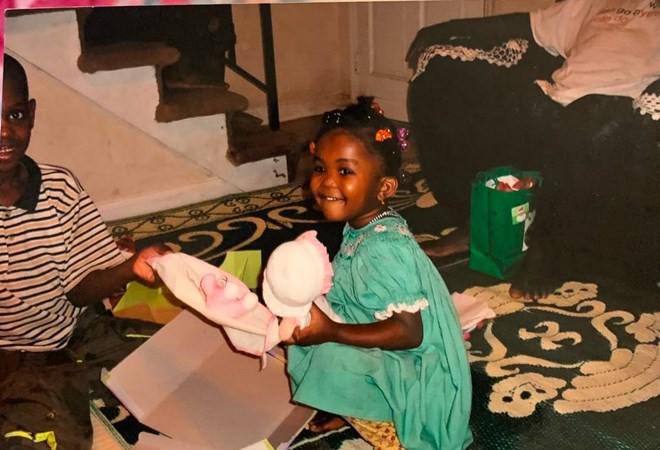
Faduma in a photograph taken in Charlotte in December 2004, less than a year after the family arrived in the U.S. from Kenya. COURTESY OF FADUMA OSMAN
On Feb. 28, 2004, when Faduma was 1 year old, Nur and Khadija peered fearfully out the window of a plane as they approached the airport in their assigned city of Charlotte to see what quite literally looked like an alien world.
It was the first time they had ever seen snow.
SETTLING INTO A NEW LIFE, AGAIN
Upon arrival, the family of seven was placed in a two-bedroom apartment and given financial assistance and transitional support as social workers tried to help Nur get a job.
He spoke only a few words of English and had no formal education, so it took him awhile to land something, and the position paid him only minimum wage. Welfare checks were critical to helping them get by for the first several years. Food, shelter and water were the family’s greatest luxuries. They had almost no disposable income.
Right before they moved into their current five-bedroom place in 2011, Nur and Khadija shared a bedroom with Faduma, her younger brothers Mahamad and Osman, and their then-baby sister Isha.
But the one thing Nur and Khadija never worried about was their kids’ educations.
And while all of their children have done well in school, Faduma stands out — and she stood out early on.
A MODEL STUDENT
When Faduma was at Cotswold Elementary, she was one of the school’s two fourth-graders selected to be in a youth-empowerment program called Wayfinders, which serves low-income students in grades 4-12 identified as having both strong grades and leadership potential.
As part of Wayfinders, she was provided a variety of overnight summer camp experiences, enrichment opportunities, and mentoring.
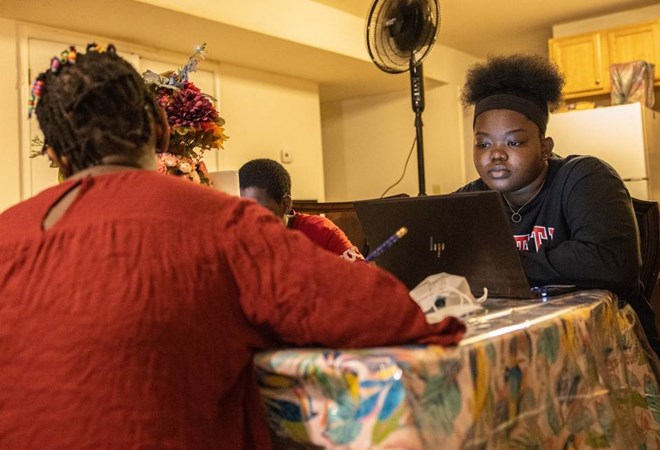
Faduma works on homework with her siblings in their Charlotte apartment. Khadejeh NikouyehKNIKOUYEH@CHARLOTTEOBSERVER.COM
If she struggled with anything when she was younger, it was her identity — and her parents’.
"10-year-old me, when my parents came to a concert at school or a play or something, I’d have to talk to them not in English. I just didn’t want do that, because everybody spoke English and I didn’t want to speak a different language because I thought that was embarrassing. I was already really shy.”
She never developed into an extrovert, but she did quietly blossom into a model student.
At Myers Park High, she helped lead a club called Supportive Students that provided mental-health resources to classmates; helped lead a school-wide initiative called "Diversity Our Narrative,” focused on diversifying textbooks in classes like History; was involved in Carolina Youth Coalition, a college-prep program; and was an active member of both the Key Club and a club called Change Makers.
She spent most of her high school years working at Chick-fil-A, consistently juggling a full class load with seven- to eight-hours shifts three days a week.
Faduma had been saving like crazy, aware of the costs associated not just with college, but also — once she’d settled on N.C. State as her top pick — with becoming the first of her siblings to move away from Charlotte to attend it. What she didn’t save she often contributed to help her parents make ends meet.
Then, in early March, Faduma learned that she was being awarded a scholarship through the university’s "Pack Promise” program, which caters to low-income students. It will cover 100% of tuition, room and board, books, and meal plans.
She celebrated by buying herself the used Nissan.
‘THEY’VE BEEN THROUGH SO MUCH’
Faduma has also done a fair amount of reflecting as her time at Myers Park has wound down and her excitement for trading the small room in her family’s apartment for a dorm room on campus in Raleigh has built up.
She acknowledges that, these days, she spends a lot less time feeling awkward about her parents and a lot more time feeling proud of them.
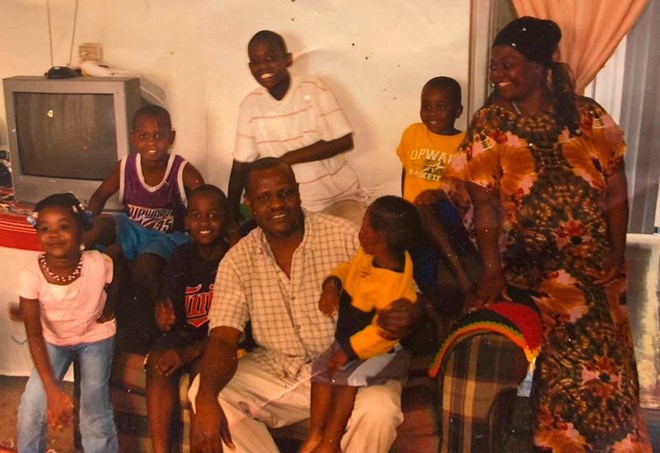
A family photo taken in 2007 at their first apartment. With Faduma are her brothers Yusuf, Ali, Abdul and Ramazani, her mother Khadija, her father Nur, who has her brother Mahamad in his lap. COURTESY OF FADUMA OSMAN
"Definitely, just because if they didn’t come here, if they didn’t get approved (as refugees), my life would have looked like that,” Faduma says, referring to her mother’s stories of the family’s flight through the forest from Somalia to Kenya. "My own car ... that’s not something that I would have if we were over there.”
"They’ve been through so much,” she continues, "and just to think about how my parents had to do all of that just for me to go to school and drive my own car ... is really crazy to me.”
In fact, Faduma has come to embrace her roots fully enough that she now has a long-term goal of working in the biomedical engineering field in Kenya and/or Somalia, in no small part because she wants to be a role model to young girls over there who might have very limited ideas of what their own potential might be.
But there’s a good chance she’ll be inspiring young girls back in Somalia much sooner than that.
When her older brother Ali graduated from UNC Charlotte with a bachelor of science in business administration — becoming the first person in the family to ever complete college — her grandfather, who still lives in Somalia, put a picture of Ali on his wall. Children would come to see the picture, and they’d stand in awe of what Ali had accomplished.
Any day now, her grandfather will add something to his makeshift shrine.
It will be a picture of Faduma.
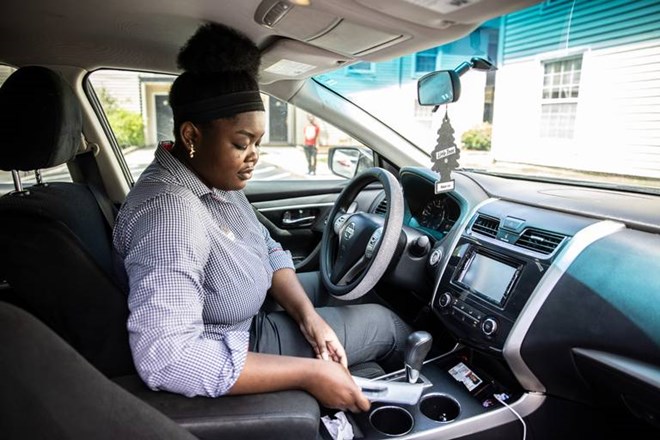
"They’ve been through so much,” Faduma Osman says, "and just to think about how my parents had to do all of that just for me to go to school and drive my own car ... is really crazy to me.” KHADEJEH NIKOUYEHKNIKOUYEH@CHARLOTTEOBSERVER.COM
Her path to university was paved by parents who risked their lives to flee Somali war
On the surface, Faduma Osman can seem like a typical American teenager. Her favorite musical artists are people many grown-ups have never heard of, including Polo G, and Olivia Rodrigo, and Jack Harlow.